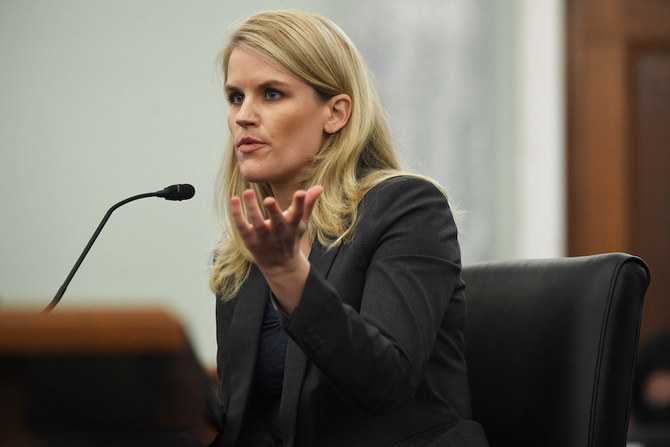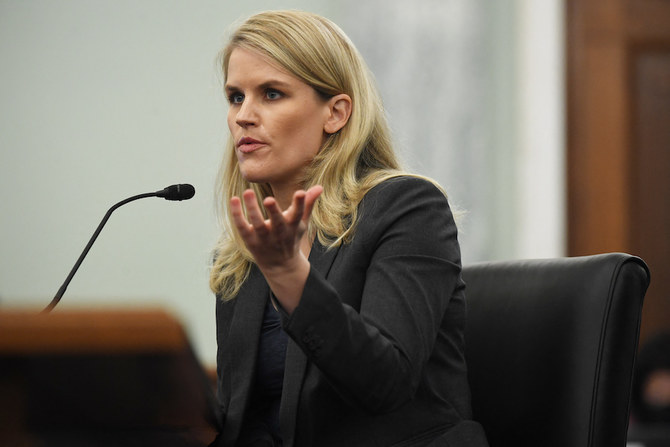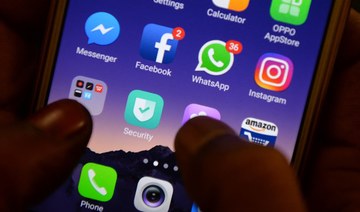WASHINGTON: A former Facebook data scientist told Congress on Tuesday that the social network giant’s products harm children and fuel polarization in the US while its executives refuse to change because they elevate profits over safety. And she laid responsibility with the company’s CEO Mark Zuckerberg.
Frances Haugen testified to the Senate Commerce Subcommittee on Consumer Protection. Speaking confidently at a charged hearing, she accused the company of being aware of apparent harm to some teens from Instagram and being dishonest in its public fight against hate and misinformation.
“Facebook’s products harm children, stoke division and weaken our democracy,” Haugen said. “The company’s leadership knows how to make Facebook and Instagram safer but won’t make the necessary changes because they have put their astronomical profits before people.”
“Congressional action is needed,” she said. “They won’t solve this crisis without your help.”
Haugen said the company has acknowledged publicly that integrity controls were crucially needed for its systems that stoke the engagement of users, but then it disabled some of those controls.
In dialogue with receptive senators of both parties, Haugen, who focused on algorithm products in her work at Facebook, explained the importance to the company of algorithms that govern what shows up on users’ news feeds. She said a 2018 change to the content flow contributed to more divisiveness and ill will in a network ostensibly created to bring people closer together.
Despite the enmity that the new algorithms were feeding, she said Facebook found that they helped keep people coming back — a pattern that helped the social media giant sell more of the digital ads that generate most of its revenue.
Senators agreed.
“It has profited off spreading misinformation and disinformation and sowing hate,” said Sen. Richard Blumenthal, D-Connecticut, the panel’s chairman. “Facebook’s answers to Facebook’s destructive impact always seems to be more Facebook, we need more Facebook — which means more pain, and more money for Facebook.”
Haugen said she believed Facebook didn’t set out to build a destructive platform. But “in the end, the buck stops with Mark,” she said referring to Zuckerberg, who controls more than 50 percent of Facebook’s voting shares. “There is no one currently holding Mark accountable but himself.”
Haugen said she believed that Zuckerberg was familiar with some of the internal research showing concerns for potential negative impacts of Instagram.
The government needs to step in with stricter oversight of the company, Haugen said.
Like fellow tech giants Google, Amazon and Apple, Facebook has enjoyed minimal regulation. A number of bipartisan legislative proposals for the tech industry address data privacy, protection of young people and anti-competitive conduct. But getting new laws through Congress is a heavy slog. The Federal Trade Commission has adopted a stricter stance recently toward Facebook and other companies.
The subcommittee is examining Facebook’s use of information from its own researchers on Instagram that could indicate potential harm for some of its young users, especially girls, while it publicly downplayed the negative impacts. For some of the teens devoted to Facebook’s popular photo-sharing platform, the peer pressure generated by the visually focused Instagram led to mental health and body-image problems, and in some cases, eating disorders and suicidal thoughts, the research leaked by Haugen showed.
One internal study cited 13.5 percent of teen girls saying Instagram makes thoughts of suicide worse and 17 percent of teen girls saying it makes eating disorders worse.
Because of the drive for user engagement, Haugen testified, “Facebook knows that they are leading young users to anorexia content. ... It’s just like cigarettes. Teenagers don’t have any self-regulation. We need to protect the kids.”
Haugen has come forward with a wide-ranging condemnation of Facebook, buttressed with tens of thousands of pages of internal research documents she secretly copied before leaving her job in the company’s civic integrity unit. She also has filed complaints with federal authorities alleging that Facebook’s own research shows that it amplifies hate, misinformation and political unrest, but the company hides what it knows.
“The company intentionally hides vital information from the public, from the US government and from governments around the world,” Haugen said. “The documents I have provided to Congress prove that Facebook has repeatedly misled the public about what its own research reveals about the safety of children, the efficacy of its artificial intelligence systems and its role in spreading divisive and extreme messages.”
The former employee challenging the social network giant with 2.8 billion users worldwide and nearly $1 trillion in market value is a 37-year-old data expert from Iowa with a degree in computer engineering and a master’s degree in business from Harvard. Prior to being recruited by Facebook in 2019, she worked for 15 years at tech companies including Google, Pinterest and Yelp.
After recent reports in The Wall Street Journal based on documents she leaked to the newspaper raised a public outcry, Haugen revealed her identity in a CBS “60 Minutes” interview aired Sunday night.
As the public relations debacle over the Instagram research grew last week, Facebook put on hold its work on a kids’ version of Instagram, which the company says is meant mainly for tweens aged 10 to 12.
Haugen said that Facebook prematurely turned off safeguards designed to thwart misinformation and incitement to violence after Joe Biden defeated Donald Trump last year, alleging that contributed to the deadly Jan. 6 assault on the US Capitol.
After the November election, Facebook dissolved the civic integrity unit where Haugen had been working. That, she says, was the moment she realized “I don’t trust that they’re willing to actually invest what needs to be invested to keep Facebook from being dangerous.”
Haugen says she told Facebook executives when they recruited her that she wanted to work in an area of the company that fights misinformation, because she had lost a friend to online conspiracy theories.
Facebook maintains that Haugen’s allegations are misleading and insists there is no evidence to support the premise that it is the primary cause of social polarization.
“Even with the most sophisticated technology, which I believe we deploy, even with the tens of thousands of people that we employ to try and maintain safety and integrity on our platform, we’re never going to be absolutely on top of this 100 percent of the time,” Nick Clegg, Facebook’s vice president of policy and public affairs, said Sunday on CNN’s “Reliable Sources.”
That’s because of the “instantaneous and spontaneous form of communication” on Facebook, Clegg said, adding, “I think we do more than any reasonable person can expect to.”
Facebook whistleblower says network profits as it hurts kids, fuels division
https://arab.news/me2qz
Facebook whistleblower says network profits as it hurts kids, fuels division

- Facebook’s leadership had rejected recommendations made to make its sites, which include Instagram, safer
- Frances Haugen, a former product manager on Facebook’s civic misinformation team, said Facebook had also done too little to prevent its platform from being used by people planning violence
Trending: BBC report suggests sexual abuse and torture in UAE-run Yemeni prisons

- The investigation was produced by British-Yemeni BBC journalist Nawal Al-Maghafi
LONDON: A recent BBC video report diving into what it says was UAE-run prison in Yemen has drawn widespread attention online and raised fresh questions about the role of the emirates in the war-torn country.
The report, published earlier this month and recently subtitled in Arabic and shared on social media, alleged that the prison — located inside a former UAE military base — was used to detain and torture detainees during interrogations, including using sexual abuse as a method.
The investigation was produced by British-Yemeni BBC journalist Nawal Al-Maghafi, who toured the site, looking into cells and what appear to be interrogation rooms.
Al-Maghafi said the Yemeni government invited the BBC team to document the facilities for the first time.
A former detainee, speaking anonymously, described severe abuse by UAE soldiers: “When we were interrogated, it was the worst. They even sexually abused us and say they will bring in the doctor. The ‘so-called’ doctor was an Emirati soldier. He beat us and ordered the soldiers to beat us too. I tried to kill myself multiple times to make it end.”
Yemeni information minister, Moammar al Eryani also appears in the report, clarifying that his government was unable to verify what occurred within sites that were under Emirati control.
“We weren’t able to access locations that were under UAE control until now,” he said, adding that “When we liberated it (Southern Yemen), we discovered these prisons, even though we were told by many victims that these prisons exist, but we didn't believe it was true.”
زارت بي بي سي مواقع داخل قواعد سابقة لدولة الإمارات العربية المتحدة في اليمن، حيث يقول محتجزون إنهم تعرضوا لسوء المعاملة. pic.twitter.com/BfS5GRxULp
— BBC News عربي (@BBCArabic) January 23, 2026
The BBC says it approached the UAE government for comment, however Abu Dhabi did not respond to its inquiries.
Allegations of secret detention sites in southern Yemen are not new. The BBC report echoes earlier reporting by the Associated Press (AP), which cited hundreds of men detained during counterterrorism operations that disappeared into a network of secret prisons where abuse was routine and torture severe.
In a 2017 investigation, the AP documented at least 18 alleged clandestine detention sites — inside military bases, ports, an airport, private villas and even a nightclub — either run by the UAE or Yemeni forces trained and backed by Abu Dhabi.
The report cited accounts from former detainees, relatives, civil rights lawyers and Yemeni military officials.
Following the investigation, Yemen’s then-interior minister called on the UAE to shut down the facilities or hand them over, and said that detainees were freed in the weeks following the allegations.
The renewed attention comes amid online speculation about strains between Saudi Arabia and the UAE over Yemen.














